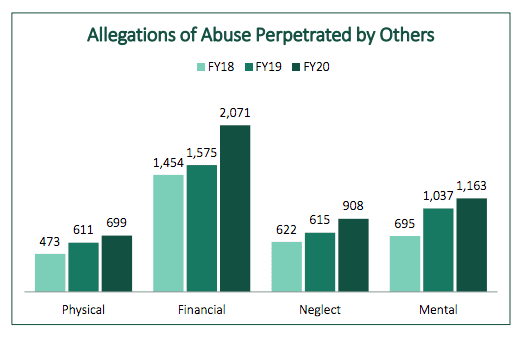Incidents of elder and dependent adult abuse have been climbing in Santa Clara County since 2013, but the biggest spike occurred last year while residents were sheltering inside their homes.
Meanwhile, the county’s adult protective services struggled with understaffing due to the COVID-19 pandemic.
The county’s department in 2018 and 2019 received about 5,900 abuse complaints, while in 2020 complaints rose to more than 6,300—a 400 case, or nearly 7% increase. Director of Department of Aging and Adult Services Mary Ann Warren said the rise is attributed to shelter-in-place orders over the past year combined with a rapidly-aging population.
“Even when you don’t think of yourself as an elder in our community—that’s when you’re most vulnerable,” Warren said. “For a lot of our clients, it’s easier to rob one of our clients than it is to rob a bank.”
Warren said complaints of financial abuse and self-neglect also rose dramatically last year.
California defines nine categories of abuse that county departments are required to investigate: physical, sexual, financial, neglect, self-neglect, abandonment, abduction, isolation and emotional or psychological abuse.
“This problem has been steadily increasing across the country for a number of years, and was only exacerbated last year due to the pandemic not allowing (adult protective services) social workers to go out and conduct in-person safety and wellness checks as frequently,” said Sheri Burns, executive director of the Silicon Valley Independent Living Center. “Most assessments, after a report was made to (adult protective services) were conducted over the phone which does not allow the social worker to get a true sense of what is going on.”
Burns said the remote assessments also make it difficult, because the elder or dependent adult “doesn’t feel safe to share truthful information” when an abuser is present, or because they fear being taken from their home.
Adult protective services are mandated by California law, requiring county programs to receive reports and investigate allegations of abuse and neglect for adults over 65. The state also requires the county to monitor abuse allegations against “dependent adults”—people aged 18 to 64 with a disability that prevents them from advocating for themselves or making independent decisions.
Reports can be made by the victim, as well as concerned neighbors, friends and family.
Since the pandemic started, the FBI has reported a spike in elder fraud across the country, driven in part by COVID-related schemes. As of May 2020, the bureau received about 320,000 complaints—nearly the same number they had for the entirety of 2019.
Warren said incidents of self-neglect in particular have risen throughout the county. County data shows those numbers tripled from about 600 cases in previous years to 900 cases in 2020.
District Attorney Jeff Rosen wrote an op-ed for this news organization in January detailing the rise in elder fraud cases in Santa Clara County and providing seniors with tips to avoid scams via phone calls, the mail or emails.
“As seniors isolate, scammers offer help in running errands or performing services, like landscaping and construction. Instead of helping ‘grandma,’ they take off with her money,” Rosen wrote.


Staff cuts
But as cases of elder abuse rise, those who investigate and fight it have diminished.
The county’s Adult Protective Services Department has taken a hit in the past year. Some employees retired early with the county’s voluntary separation program, an effort to cut jobs without laying people off. Other employees are helping the county with COVID-19 vaccinations.
At the beginning of last year, the department had 32 employees working on case investigations. Now they’re down to 24 workers, leading to a case back log.
“By saying what’s not working,” said Supervisor Cindy Chavez, “it gives us a chance to have a conversation about what could work, particularly as it relates to staffing shortages.”
Burns of the Independent Living Center said a crucial program protecting victims, called Home Safe, is about to expire in June. The program, funded by the state and a county, helps support housing stability for clients, including short-term financial assistance, legal services, eviction prevention and landlord mediation, among other services.
“The Home Safe intervention program has proven successful outcomes, and we need it to continue and be expanded elsewhere,” Burns said, “as the number of older and dependent adults experiencing abuse or neglect continues to rise by the day.”
County officials will return in April to supervisors with recommendations for staffing changes and addressing the increase in abuse reports.
To report known or suspected elder abuse, call the county’s adult protective services at 408-975-4900 or 800-414-2002. The hotline is available 24 hours a day. The District Attorney’s Office has an elder fraud hotline at 855-323-5337 dedicated to investigate and prosecute cases of elder fraud.
For abuse that occurs in a licensed long-term care facility, call the long term-care ombudsman at 408-944-0567.
Contact Madelyn Reese at [email protected] or follow @MadelynGReese on Twitter.
A-Good-Place-to-Start-2020


Leave a Reply
You must be logged in to post a comment.